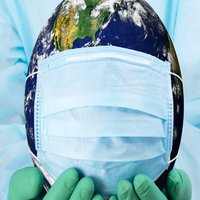Research Activities and Information on the Corona Pandemic
Publications of the Wuppertal Institute

Publications of the Wuppertal Institute

In recent months, the novel coronavirus has developed into a global crisis of unimagined magnitude that has shaken all areas of our lives. The consequences for society and the economy are immense and will probably continue to accompany us for some years to come. Moreover, the crisis arises at a time when a multitude of challenges must be overcome. It cannot be denied that the massive collapse in economic activity and isolation will bring short-term relief for the environment. Satellite images from the European Space Agency (ESA) show a significant drop in the nitrogen dioxide content of the air over northern Italy, the sky is free of contrails and cars are left in the garage, resulting in around 5.5 per cent less CO2 being emitted this year than in 2019.
These and many other issues surrounding the Corona pandemic and its effects are examined in more detail by the Wuppertal Institute's researchers in discussion papers and impulses. In this context, the Wuppertal Institute presents the following selection of publications.
The consequences of the corona pandemic and climate protection - what measures are needed to advance climate protection?
The Corona pandemic poses challenges to the economies, with which they were last confronted on this scale in the financial crisis of 2008/2009. It is precisely in these times that economic aid in the form of economic stimulus packages from governments is becoming an important measure of saving companies and industries, at least in the short term. These funds have a steering function and it is decisive how they are distributed, say the scientific directors of the Wuppertal Institute, Prof. Dr. Manfred Fischedick and Prof. Dr. Uwe Schneidewind in their discussion paper "Consequences of the Corona Crisis and Climate Protection – Keeping an eye on the long-term future". The aim of the measures should be a future-oriented investment to further improve climate protection.
Make COP26 the Conference for a Green Recovery
But what about the long-term impact on the environment? Climate change and measures for environmental protection seem to take a back seat in the current situation. The United Nations World Climate Conference, which should have been taken place in Glasgow this year, has been postponed until next year. However, this conference would have been important to put climate protection higher on the agenda of governments. Wolfgang Obergassel, Co-Head of the International Climate Policy Research Unit in the Energy, Transport and Climate Policy Division at the Wuppertal Institute, also emphasises that without the World Climate Summit, political pressure will no longer exist for the time being. The extent to which the World Climate Conference and global climate policy can play a role in promoting a green recovery is discussed in the article "Make COP26 the Conference for a Green Recovery" by Wolfgang Obergassel and Lukas Hermwille (both International Climate Policy Research Unit at the Wuppertal Institute).
International climate governance can promote sustainable recovery
Governments around the world are responding with extensive economic stimulus packages to the crisis triggered by the COVID-19 pandemic. The design of these economic stimulus packages will also determine central framework conditions for future climate policy: The stimulus packages can either provide a strong impetus for a climate-friendly economy or cement unsustainable economic practices. In the new article "Harnessing international climate governance to drive a sustainable recovery from the COVID-19 pandemic," Wolfgang Obergassel, Co-Head of the Global Climate Governance Research Unit at the Wuppertal Institute, Lukas Hermwille, Senior Researcher in the same Research Unit, and Sebastian Oberthür from the Free University of Brussels discuss how international climate policy can contribute to a green recovery. In the end of October, the article was published in the journal Climate Policy and is a further developed version of the Wuppertal Institute's discussion paper published in June 2020.
Boost cleantech momentum in the post-COVID-19 era
The current crisis will make it more difficult to maintain the necessary pace of cleantech development. A faltering global economy and new ways of working will bring challenges and COVID-19 will make it more difficult to maintain the necessary pace of cleantech development. The authors Prof. Dr. Manfred Fischedick, Scientific Managing Director at the Wuppertal Institute, and Peter Schniering, Founder of Future Cleantech Architects, present three ways on how to face these challenges in a guest article for the World Economic Forum.
Further information and the complete publications can be found under the following links. Stay informed: #CoronaTransformation.
Further information
Links
- Zukunftskunst: Make COP26 the Conference for a Green Recovery
- World Economic Forum: 3 ways to boost cleantech momentum in the post-COVID-19-era
- Climate Policy: Harnessing international climate governance to drive a sustainable recovery from the COVID-19 pandemic
- Harnessing International Climate Governance to Drive Green Post-Pandemic Recovery
- Consequences of the Corona Pandemic and Climate Protection
- The Outlook for the European Green Deal in the Light of the Corona Pandemic
